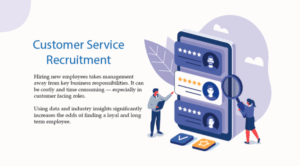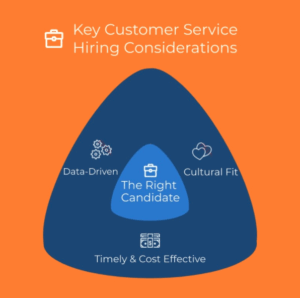
Hiring the right people for the job is crucial for the success of small businesses — the employees representing your company can make the entire difference between a loyal or disgruntled customer.
Customer service is often the key differentiator for many small businesses. Shoppers are much more likely to return to a business that offers a high-level of service or goes out of their way to ensure they leave happy after each visit.
So what makes the difference for your customers? How can you hire the right people to ensure you maximize customer satisfaction and ensure they leave with the right information every time?
Today, we’re going to examine a few of the key challenges facing small businesses when it comes to their employees and hiring the right people.
High Turnover
The largest problem small businesses face in regard to customer service is high turnover. Losing employees and hiring is time-consuming and costs money — according to the talent acquisition firm ADP, the average cost of hiring a new employee is $4,129. The management team also has to devote some of their time and energy to the hiring process rather than business productivity.
In addition to hiring, it can take several weeks or months to get your new employee up to speed depending on the complexity of their work. During this period, they’re probably not generating their full potential revenue.
The cost to each individual business differs depending on the role, industry, education, and level of experience required but the lesson is, hiring is expensive.
Turnover is one of the largest struggles for business and their managers. When a valued employee leaves it can have several negative implications beyond losing a team member.
If your employee has built relationships with key customers, it can take a long time to rebuild these relationships with your new hire — potentially resulting in lost sales in the long term.
Turnover can also affect your workplace culture and morale. If other employees start to notice significant turnover, they may start to question why the business is struggling to retain their key people which leads us into the next challenge.
Finding the Right Applicants
High turnover is often the result of a poor cultural fit. As we mentioned above, hiring is costly and time-consuming — and even more so if it turns out the employee is not the right fit for your business, starting the entire process over again.
This may be a result of simply trying to fill the position rather than finding the most qualified candidate which is understandable. Reading resumes and conducting interviews can be exhausting when there are other business operations that need to be tended to.
Writing a high-quality job description can help attract the right applicant, rather than requiring management to weed through several unqualified candidates or those who may not be a good cultural fit.
Once you’ve found a few desirable candidates, try to keep your focus on the interview. If you’ve already determined they have the required skills or experience, it’s crucial to determine if they are the right cultural fit — the last thing any business wants is for a new hire to not work out as a result of culture, only to have to start the process all over again.
Finding the right applicants can be terribly difficult, especially in a customer-facing role. These people are the face and voice of your business so it’s crucial they represent your brand well.

Lack of Data
Most small businesses keep track of critical operational data like profits, costs, inventory levels, customer conversion rate, and more.
Lack of data may seem like an unusual challenge in the context of hiring. However, using data to your advantage in recruiting is an extremely powerful tool — it significantly can reduce the time and money required to recruit a new candidate and help your business hire better employees.
Many small businesses do not take data into consideration when looking for new employees and as a result have next to no metrics to refer to when it comes time to hire. These metrics can be extremely useful in determining what qualities and skills you’re looking for before you even begin the hiring process — and choose better candidates.
Let’s establish a good starting point for small businesses — here are two metrics you may want to consider when hiring your next employee:
- Cost-per-Hire
This metric tells you how much it actually costs the business to hire a new employee. It includes internal costs like salaries of management and external costs like job advertisements. Divide the total cost by the total number of hires and you can see how much you are paying to get someone on the team — this metric generally doesn’t include the cost of training once they’re hired.
- Time to hire
Depending on the industry, role, other factors, hiring times can vary significantly. However, it is still a useful metric to track. It can typically be defined as the number of days from the position being open to offering employment. It’s an extremely useful metric because it can help you determine inefficiencies in your hiring process — reducing time to hire can help you keep qualified candidates interested.
Keeping track of these metrics can help reduce the cost of time required when you need to fill a role. Although there are many other considerations, keeping track of data like that listed above can help a small business make better hiring decisions while reducing costs and loss of time.

Omnie Integrated Services
What challenges have you experienced during the hiring process? Omnie understands the difficulties faced by many small businesses across North America when it comes to hiring and retaining the right individuals — especially in customer facing roles.
Our focus is to reduce these stresses on small business owners and managers by providing brand aligned and integrated customer service so you can focus on your operational goals. We are a data driven business using industry and customer service insights to increase revenues and customer satisfaction.
Omnie has built a team of professional, customer focused individuals who care about helping you grow your business — read more about our team here.
